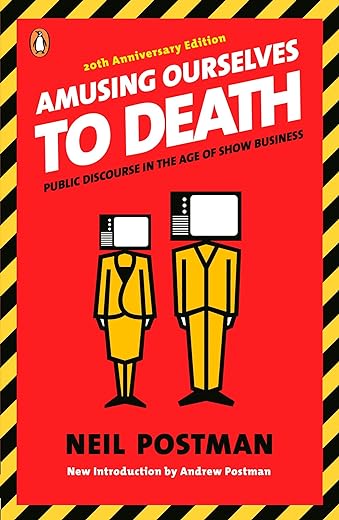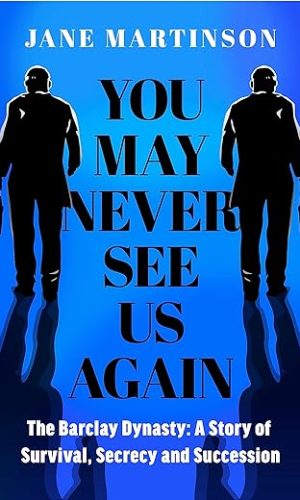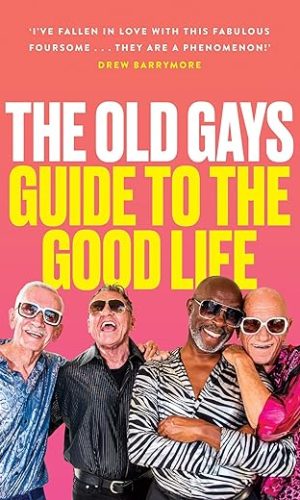Amusing Ourselves to Death: Public Discourse in the Age of Show Business
£19.36
Originally published in 1985, Neil Postmans groundbreaking polemic about the corrosive effects of television on our politics and public discourse has been hailed as a twenty-first-century book published in the twentieth century. Now, with television joined by more sophisticated electronic mediafrom the Internet to cell phones to DVDsit has taken on even greater significance. Amusing Ourselves to Death is a prophetic look at what happens when politics, journalism, education, and even religion become subject to the demands of entertainment. It is also a blueprint for regaining controlof our media, so that they can serve our highest goals.
Read more
Additional information
| Publisher | Penguin Books, Anniversary edition (1 Jan. 1900) |
|---|---|
| Language | English |
| Paperback | 208 pages |
| ISBN-10 | 014303653X |
| ISBN-13 | 978-0143036531 |
| Dimensions | 1.52 x 12.95 x 19.56 cm |










by João Francisco Botelho.
excellent
by Mike S
An analysis that whilst written pre the age of the widespread social media that plagues discourse today is wholly relevant to the current absurdities of the 140+ character inanity and ‘likes’ of ‘friends’ we have never met, if indeed they actually exist. It would be good to have an equivalent analysis of the present day, but this is remarkablein that it says mych about has subsequently happened in the post TV and hard media world of the dumbing down of politics and social interactions.
by Paolo
This book is great in terms of the train of thoughts and reasoning that is able to trigger and it’s very valuable in its long term and historical point of view on media and content diffusion in the modern age.
The book is massively interesting on 2 fronts
1) Raising awareness on the impact of new media (television being the new media at the time Postman was writing) on communication, content and cognition
2) Analyzing the long term, major impact of new medias effects on political, social and cultural trends.
Even if the book was written before the entire internet revolution happened it’s still very current and the trends and consequences identified by Postman are still in full force and effect in 2014.
by Tony Durrant
Brilliant prophetic book. A must read work.
by gerry rafferty
really good read
by John Williams
The language of this book is quite dense in parts, and the arguments are complex, so it took me a while to get to grips with it, which, I suppose, makes me a living proof that Postman is right about what tlelvision has done to my generation. Having got over this hurdle, I found the book thought provoking and even, dare I say it, entertaining. Many of us have our suspicions about the adverse effects that television has on our society and culture. No-one articulates them better than Postman.
For ‘show business’ read ‘television’, as Postman’s main beef is with TV. No doubt had he been writing this book today he would have included the internet and various other electronic means of communication. The ‘public discourse’ of the subtitle covers religion, advertising, news and education as well as politics. Postman’s contention is that none of these are suited to being disseminated on TV, which is essentially an entertainment medium. So whereas watching ‘The A Team’ does us no harm at all, watching the TV news or ‘Sesame Street’ does.
The book has as a running theme the contrasting future dystopias presented in Orwell’s ‘1984’ and Huxley’s ‘Brave New World’. Postman argues that it is the Huxleyan rather than the Orwellian future that we should fear the most. TV is now our soma. In the last chapter, he writes, ‘In the Huxleyan prophecy, Big Brother does not watch us, by his choice. We watch him, by ours.’ What a pity that Postman is no longer around to give us his thoughts on a certain Channel 4 programme.
by Andy H
This book is not as dated as one could imagine and I would recommend reading the forward last or at least re-reading it once the book is finished. I would have liked to have seen a chapter on how religion has a similar ‘diversionary’ function. Well worth a read.
by Stuart Brown
This is an excellent book. It may have originally been written in 1985, but if anything, is more relevant then ever before.
This should absolutely be required reading for everyone.
Read and marvel at a very presient man.